The first and second panels of the International Online Conference have ended
In the frame of the International Online Conference, four panels are scheduled, during which participants have the possibility to exchange views on a number of topical issues of constitutional justice.
 In particular, the first two panels have already taken place.
In particular, the first two panels have already taken place.
Thus, during the discussion of constitutional control as a mechanism for resolving conflicts of interpretation, the President of the Supreme Court Valentyna Danishevska, Judge of the European Court of Human Rights Armen Harutyunyan  and President of the National Academy of Law of Ukraine, Doctor of Law, Professor, Member of the National Academy of Law Sciences of Ukraine Oleksandr Petryshyn delivered their presentations. Deputy Chairman of the Constitutional Court of Ukraine Serhiy Holovaty moderated the event.
and President of the National Academy of Law of Ukraine, Doctor of Law, Professor, Member of the National Academy of Law Sciences of Ukraine Oleksandr Petryshyn delivered their presentations. Deputy Chairman of the Constitutional Court of Ukraine Serhiy Holovaty moderated the event.
During the discussion, the participants raised the issue of interpretation of the Constitution of Ukraine and the laws of Ukraine. In particular, it is noted that in 2016, after amendments to the Basic Law of the state in the field of justice, the official interpretation of the laws of Ukraine was removed from the powers of the Constitutional Court of Ukraine. Nevertheless, 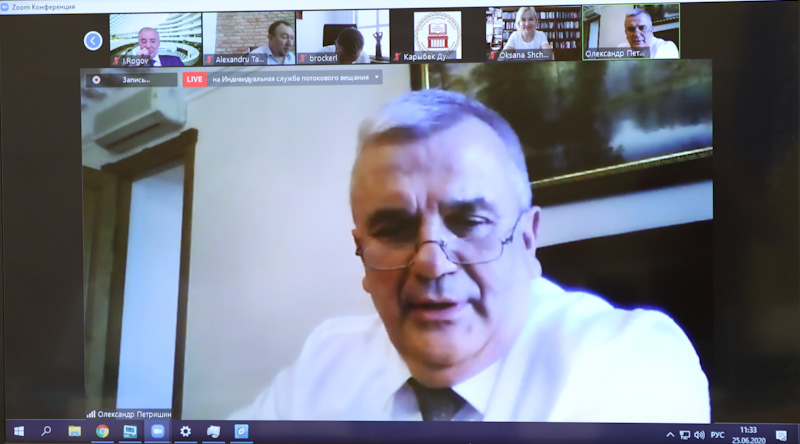 the body of constitutional control in resolving cases still resorts to their dynamic interpretation.
the body of constitutional control in resolving cases still resorts to their dynamic interpretation.
The interlocutors pointed out that the interpretation of the rule of law is the right and duty of judges in the administration of justice. They also stressed that legal provisions cannot 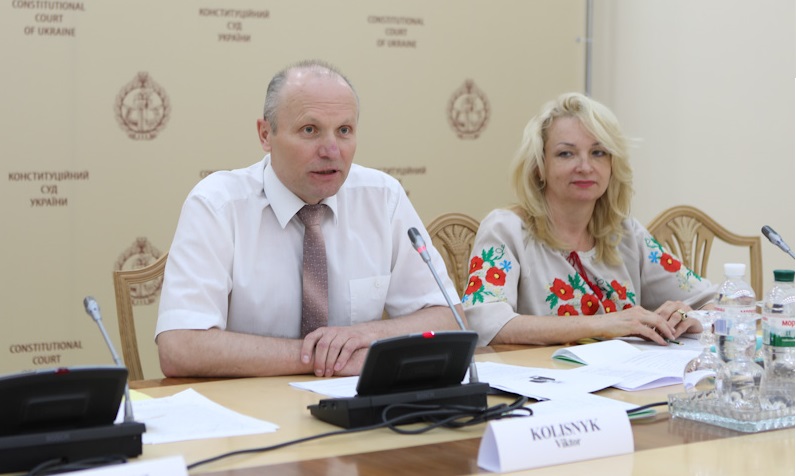 be perfect, so they need to be interpreted, supplemented or clarified.
be perfect, so they need to be interpreted, supplemented or clarified.
During the second panel, questions were raised about objects of interpretation in constitutional proceedings upon constitutional petitions, constitutional appeals and constitutional complaints.
Judge of the Constitutional Court of Ukraine Viktor Kolisnyk moderated the panel.
The speakers were Christos Giakoumopoulos, Director General, Directorate General of Human Rights and Rule of Law, Council of Europe,  Andrii Kostin, People’s Deputy of Ukraine, Head of the Verkhovna Rada of Ukraine Committee on Legal Policy. Yurii Shemshuchenko, the Director of the Institute of State and Law named after V.M. Koretsky of the National Academy of Science of Ukraine, Doctor of Law, Professor, Member of the National Academy of Sciences of Ukraine, Member of the National
Andrii Kostin, People’s Deputy of Ukraine, Head of the Verkhovna Rada of Ukraine Committee on Legal Policy. Yurii Shemshuchenko, the Director of the Institute of State and Law named after V.M. Koretsky of the National Academy of Science of Ukraine, Doctor of Law, Professor, Member of the National Academy of Sciences of Ukraine, Member of the National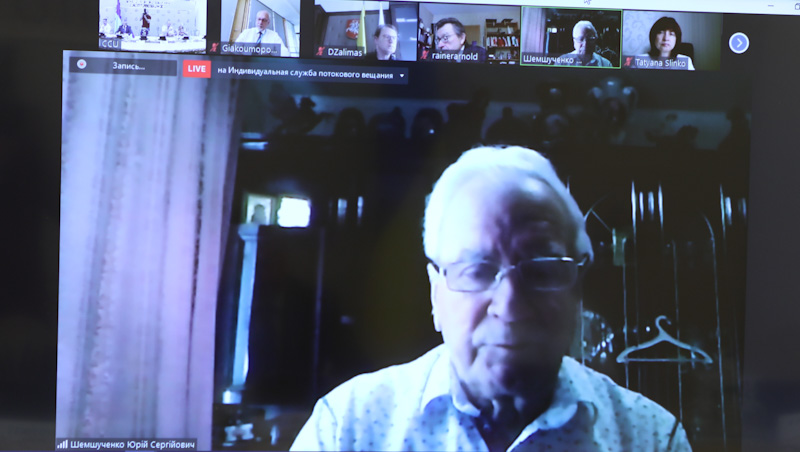 Academy of Legal Sciences of Ukraine and Olha Sovhyria, Permanent Representative of the Verkhovna Rada of Ukraine to the Constitutional Court of Ukraine, People’s Deputy of Ukraine, Deputy Head of the Verkhovna Rada of Ukraine Committee on Legal Policy, Head of the Subcommittee on Political Reform and Constitutional Law of the Verkhovna Rada of Ukraine Committee on Legal Policy joined the discussion.
Academy of Legal Sciences of Ukraine and Olha Sovhyria, Permanent Representative of the Verkhovna Rada of Ukraine to the Constitutional Court of Ukraine, People’s Deputy of Ukraine, Deputy Head of the Verkhovna Rada of Ukraine Committee on Legal Policy, Head of the Subcommittee on Political Reform and Constitutional Law of the Verkhovna Rada of Ukraine Committee on Legal Policy joined the discussion.
The participants of the conference emphasised the decisive role of the Constitutional Court of Ukraine in ensuring human and citizen’s rights and freedoms. Its role in ensuring the execution of ECtHR judgments was also pointed out. The speakers did not overlook the 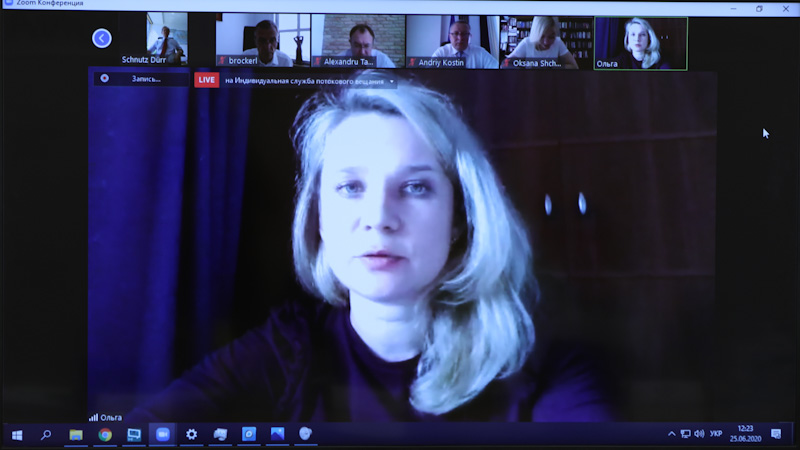 problematic issues that arose before the body of constitutional jurisdiction of the country, including in the context of the functioning of the institution of constitutional complaint in Ukraine.
problematic issues that arose before the body of constitutional jurisdiction of the country, including in the context of the functioning of the institution of constitutional complaint in Ukraine.
The participants also touched upon the decisions adopted by the Constitutional Court. In particular, Christos Giakoumopoulos, Director General, Directorate General of Human Rights and Rule of Law, Council of Europe, welcomed the recent decision by the Constitutional Court of Ukraine on the unconstitutionality of Article 375 of the Criminal Code, which established criminal liability of judges for adopting delivering a “knowingly unjust” decision, without explaining the criteria of “unjustness”. 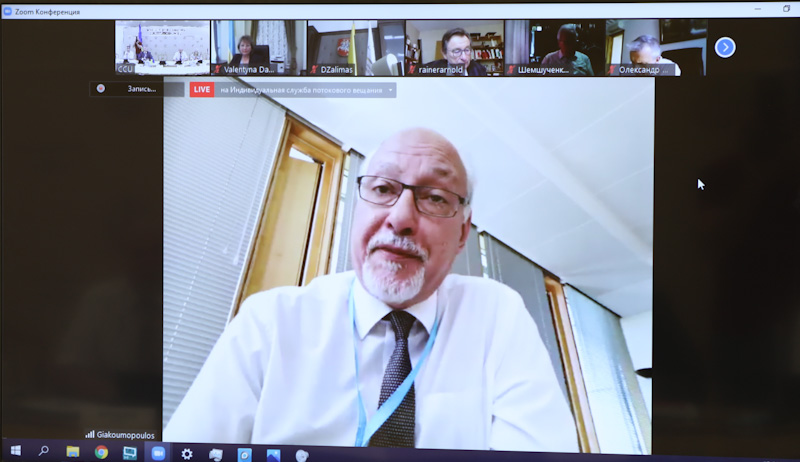 He noted that the Constitutional Court of Ukraine in adopting the Decision took into account the recommendations of the Committee of Ministers of the Council of Europe on the execution by Ukraine of the judgments of the European Court of Human Rights on the independence of judges. The speaker stressed that this decision will help strengthen the independence of the judiciary in the country.
He noted that the Constitutional Court of Ukraine in adopting the Decision took into account the recommendations of the Committee of Ministers of the Council of Europe on the execution by Ukraine of the judgments of the European Court of Human Rights on the independence of judges. The speaker stressed that this decision will help strengthen the independence of the judiciary in the country.
During the discussion, they talked about the content of constitutional petitions in terms of their validity and analysed the foreign experience of constitutional courts on these issues.
The participants also stressed the importance of establishing effective communication between all branches of government in order to strengthen the rule of law in the country and protect human and citizen’s rights and freedoms.

